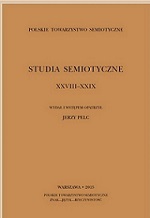Jak przygodne i jak a priori są przygodne prawdy a priori?
How Contingent and How a Priori Are Contingent a Priori Truths?
Author(s): Jacek WawerSubject(s): Logic, Philosophy of Language
Published by: Polskie Towarzystwo Semiotyczne
Keywords: a priori; contingency; modality; time
Summary/Abstract: W artykule poddaję analizie słynne twierdzenie Saula Kripkego, że niektóre prawdy a priori są przygodne. Pokazuję, że wbrew tezie Kripkego, przy historycznym rozumieniu przygodności, pojęcia przygodności i aprioryczności stoją ze sobą w głębokim konflikcie. Przy tym rozumieniu przygodności przeszłość, którą można poznać a priori, nie jest przygodna, a o przyszłości, która jest przygodna, trudno zdobyć wiedzę a priori. Doprecyzowawszy tezę Kripkego, proponuję trzy sposoby jej obrony w kontekście historycznego rozumienia możliwości: (a) przez wprowadzenie pojęcia “faktycznej” przyszłości, (b) przez zastąpienie pojęcia aprioryczności pojęciem aprioryczności-w-przyszłości; (c) przez zastąpienie pojęcia aprioryczności pojęciem historycznej aprioryczności, a pojęcia przygodności pojęciem niegdyś-przygodności. W aneksie do artykułu przedstawiam formalną analizę postawionego przeze mnie problemu oraz trzech zaproponowanych przeze mnie rozwiązań w języku temporalno-modalnej logiki predykatów dla modeli indeterministycznego czasu. ===== In the presented article, I have analyzed the famous Saul Kripke statement that some a priori truths are contingent. I show, that despite Kripke’s thesis, in the historical understanding of contingency, the notions of contingency and apriority are in deep conflict with each other. In this understanding of contingency, the past, which can be known a priori, is not contingent, and the future, which is contingent, has difficulty acquiring a priori knowledge. Having stated Kripke’s thesis more precisely, I propose three means in order to defend it in the historical understanding of possibility: (a) by introducing the notion of “factual” future, (b) by replacing the notion of apriority with the notion of apriority-in-the-future; (c) by replacing the notion of apriority with the notion of historical apriority, and the notion of contingency with the notion of once-apriority. In the annex of the article, I present the formal analysis of the problem that I have introduced and three solutions which I have proposed in the language of temporal-modal logic of predicates for models of indeterministic time.
Journal: Studia Semiotyczne
- Issue Year: XXIX/2015
- Issue No: 1
- Page Range: 145-172
- Page Count: 28
- Language: Polish

